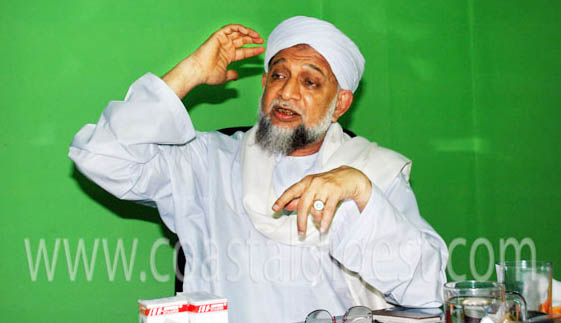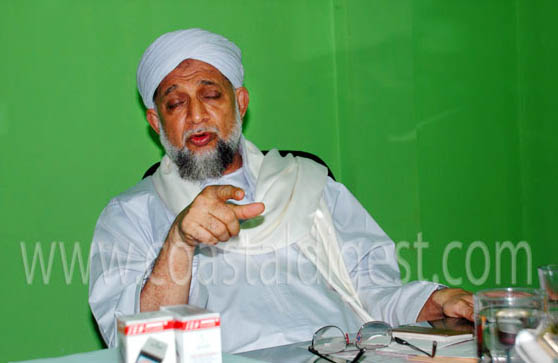“There would not have been a controversy over Babri Masjid had there been no partition,” says Twaqa Ahmad Musliyar, the Qazi of Mangalore, to drive home his point that the present communal tensions prevailing in the country have their roots in the history. A religious leader who waxes eloquent about the pluralistic culture of the country, Musliyar believes that reviving the tradition of tolerance and co-existence is the way forward for secular India. He spoke exclusively to Coastaldigest.com on the present socio-political situation, the condition of Muslims in the coastal district and the dowry menace.

Q: Communalism is on the rise and there is increasing polarization on communal lines on either side of the religious divide. What is the solution?
A: The coastal districts came into contact with Islam through Arab traders as early as 7th century A.D. The local rulers and the citizens welcomed these Arab traders with open arms and gave them hospitality. The character of those people was such that the local population was deeply impressed by them.
The prominent leader among them was Hazarat Malik bin Dinar, who settled at Kodungallur. Raja Cheruman Perumal of Malabar is believed to have offered them his gracious hospitality. One of the 10 mosques allowed to be built by the Raja was the Zeenat Baksh Jumma Masjid, which was then known as Malik Bin Dinar Masjid.
The masjid was inaugurated on Friday, 22 of Jumadil Awwal month in 22 al-Hijra, corresponding to year 644 AD, Hazarat Moosa bin Malik, son of Moosa bin Abdulla was anointed as the first Qazi. The Deenar mission also built a masjid each at Barkur and Kasargod, which came under the Kanara region. Ibrahim bin Malik and Mahmood bin Malik became the Qazi’s of Barkur and Kasargod respectively. The Qazi was the leader of the Muslims dealing with issues like marriage and family matters. On other worldly matters the Muslims were expected to follow the ruler’s diktat of that time.
The Muslim habitation in those days developed around the mosque and there was mutual respect among Hindus, Jains and Muslims.
There are a number of examples in the history of coastal districts when non-Muslim rulers donated lands to build masjids. The masjid in Gurukambla was built on a land donated by Kittur Rani Chennamma. Similarly the masjid in Ajilamogaru is built on the land given by Jain Kings. Even Muslims reciprocated the love and affection showered on them, by being loyal to the rulers. Abbakka Rani of Ullal took shelter in the Masjid in Alekal after her defeat in the first war against the Portuguese.
The pluralistic culture and history of Tulunadu or the coastal Karnataka needs to be highlighted in order to strengthen the bonds between different communities in the region.
Q: But people like Prabhakar Bhat are trying to drive a wedge between Hindus and Muslims. Even Muslims get agitated and try to react to the situation in different ways?
A: I don’t want to say anything about Bhat. I cannot stoop to his level. I would rather leave it to Allah to decide. But it is important for Muslims to know that they have to live in India as a minority. They have to lead a life of peace and happiness. This is possible only if there is proper understanding between different religious groups. I always emphasise on the importance of religious tolerance and co-existence. The best lesson that we can derive from our forefathers including saints like Malik bin Dinar is that we can live in this country as a minority with respect and dignity. They have shown us the correct way by leading a pious and religious life. In all worldly matters, including administration, they instructed people to obey the diktats of the government. This in itself is a big lesson for Muslims.

Q: But it looks easier said than done in today’s times. There is widespread misconception about Muslims and Islam. There are reactionary groups among Muslims also. The ghost of terrorism is constantly stalking the community?
A: The present communal situation in the country has its genesis in the history. Partition of India was a watershed event. Had the country not been divided into India and Pakistan, we probably would have been in a different situation. In fact, we would not have faced a problem like Babri Masjid.
When the country divided there was mass exodus on both sides of the divide. The Muslims of northern India migrated to Pakistan in large numbers. Millions of Muslims moved to Pakistan with the hope of a bright future leaving behind their land and wealth. Those who migrated were rich landlords and highly qualified educated people. They thought that they would get better opportunities in the “Islamic country” that was about to be born. The people who stayed back were predominantly working class Muslims, who did not have either political clout or economic power. They were mostly the coolis, rickshaw pullers, and the artisans.
During partition large number of non-Muslim population came to Delhi and the surrounding States and settled down in places abandoned by the Muslims who went to Pakistan. Even today when you got to some suburban areas in Delhi you will find a number of buildings resembling masjids and madrasas. But when you enter into them you will see some non-Muslim families residing there. The migrants from Pakistan took possession of the abandoned masjids and madrasas and converted them into their settlements.
In fact, the Muslim population of Ayodhya had also come down drastically after the partition. The rich and mighty had gone leaving behind the destitute and the poor. In all probability the Muslim residents in and around the Babri Masjid had also gone to Pakistan. You should understand that the Muslim community had been reeling under the shock of partition, when the Babri Masjid controversy first broke out with the installation of an idol in the 40s. I still strongly believe that the masjid would not have been demolished had the country remained united.
The partition divided Hindus and Muslims to a great extent. Even today an average Hindu believes that it was because of Muslims that Pakistan became a separate country. Even after decades, Muslims continue to be blamed for a sin which they had never committed. It has been proved historically that majority of Muslims were not in favour of creating Pakistan. Nationalist leaders like Abul Kalam Azad, Sheikul Hind, Shoukath Ali etc staunchly opposed partition. However, these facts have been pushed under the carpet and Muslims are forced to live with the stigma of partition.
Q: What is the solution?
A: We have to fight these communal elements that are against the very principle of pluralistic India. This can happen with mutual respect and increased understanding. If we deviate from the secular, pluralistic ethos of the country, we will have to face the problem of communalism, fascism and terrorism.
Q: You recently visited some families who have disabled members? What prompted you to take such an initiative? Was that part of your duty as Qazi?
A: No. I did not go there in my capacity as Qazi. I was invited by Talent Research Organisation to join them in their campaign. I felt happy when they came to me with the proposal and realized that this was something that needs to be encouraged. So I went there and discussed the problems of the poor families, who also have some physically challenged members to look after. It is not important who is doing such things. They may have invited me because that would give them some publicity. Nevertheless it was a worthy cause and I fully supported it.

Q: What about the mass marriages? Today even these marriages are becoming an opportunity for the rich to showcase their wealth? Some are even trying to legitimize their lavish weddings by sponsoring the wedding expenses of the poor couples?
A: Definitely mass marriages are not the solution for the real problem. It is just a temporary solution. But we need to agree that there are hundreds of poor families who cannot marry off their girls because of various reasons including dowry. If some organizations come forward and make arrangements for the marriage of these girls that should be encouraged.
Similarly you cannot say that by sponsoring weddings of poor girls, the rich are trying to justifying their exhibitionism and squandering of wealth. They would anyway spend that much of money on their son’s or daughter’s wedding. If they are also offering to sponsor the marriages of poor girls, that should be encouraged and we should not try to find fault in their gestures.
But as I said, this is not the permanent solution. We need to find a way out for this menace called dowry. This should happen at the Mohalla Jamath level. We have to strengthen our Mohalla Jamaths in such a way that they should be able to deal with the problems of the people residing in their Jamath. Each jamath must have a data of the socio-economic situation of the individual family. The office-bearers and Imams should have information about the drop-outs, disabled people and the destitute on their fingertips. If we revive and strengthen the Mohalla Jamaths, we can solve many of our problems. In fact, we would not require organizations and associations to fight for these issues.





Comments
Add new comment